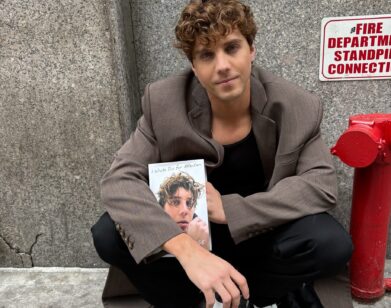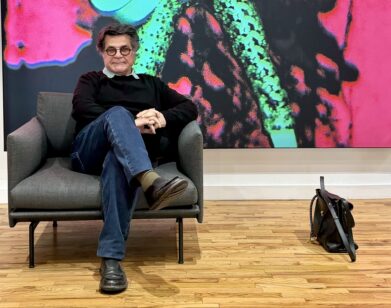Helena Bonham Carter, Staple of the Screen

If you were born in the ’90s you probably know Helena Bonham Carter best as the mad, Voldemort-loyal witch Bellatrix Lestrange from Harry Potter, or as the Red Queen in Alice in Wonderland. Others, however, surely recall her striking take on Marla Singer in David Fincher’s Fight Club, her numerous collaborations with former partner Tim Burton—including Sweeney Todd and Dark Shadows—and her turn as Queen Elizabeth in The King’s Speech, which earned the British actor an Oscar nomination. Following her early start at age 13, Bonham Carter has amassed a list of credits as extensive as it is impressive.
Most recently, the 49-year-old appears in The Young and Prodigious T.S. Spivet, which was released on Friday and directed by Oscar-nominated Jean-Pierre Jeunet. Having first encountered Jeunet’s work through the surreal comedy Amélie, Bonham Carter says, “His sensibility and whole aesthetic is very much something I love and have always admired.” In Young and Prodigious, Bonham Carter plays Dr. Clair, a mother of three children, one of who is killed in an accident on the family’s farm in Montana. While Dr. Clair mourns Layton’s death and spends her time examining and tracing the lineage of beetles, her youngest son, T.S.—who has a scientific mind of his own—receives a call from the Smithsonian Institute offering him an award for one of his blueprints. The film follows the 10-year-old eastward as he runs away from home to accept the award.
Next, Bonham Carter will appear as Edith Ellyn in the upcoming film Suffragette (out October 23), marking a return to her storied roles in period films, which began with A Room With a View in 1985. Penned by Abi Morgan (who also wrote Shame and The Iron Lady) and directed by BAFTA award winner Sarah Gavron, the film follows women as they fight tooth and nail for the right to vote in late 19th and early 20th century Great Britain. Bonham Carter stars alongside an esteemed list of actors, including Carey Mulligan, Meryl Streep, Anne-Marie Duff, and Natalie Press.
We spoke with Bonham Carter over the phone last week while she was in Florence, Italy.
HALEY WEISS: How did you become involved in The Young and Prodigious T.S. Spivet?
HELENA BONHAM CARTER: I’ve always loved Amélie and I’ve always loved Jean-Pierre [Jeunet]’s work, and I had mutual friend, in fact, who was his makeup artist who worked on his films. She warned me one day that he might email me. So I had an email in my inbox saying, “I’m thinking of writing a part for you, would you ever work with me?” And I said, “Are you kidding? If you asked me to do the phonebook, I’d be in any film that you want.” Basically, I’d pay him to work with me. It was a dream come true. He sent me the script about a year and a half later and I thought it was a no-brainer.
WEISS: As a mother of two yourself, was it difficult to take on the role of a woman who lost a child and was left to parent two grieving children?
BONHAM CARTER: Well, that’s sort of the job, really, but it wasn’t a particularly comfortable area to go to. You pray you would never have to experience those feelings or that reality. I love the fact that Jean-Pierre is not too sentimental, so [the film] wasn’t too sentimental, and it was very delicately dealt with.
WEISS: It’s melancholy, but T.S. seems to have a good grip on himself. Dr. Clair’s relationship with T.S. is unique. She supports his scientific efforts, but she’s also coping with Layton’s death, and struggling to balance her own scientific work with her motherly duties. Do you think there is a balance to be struck between work, motherhood, and mutual respect with a child?
BONHAM CARTER: Oh, god yeah. Always. Do you have children?
WEISS: No, I do not.
BONHAM CARTER: If you ever do, you’re always trying to balance [it], and you never get it, either. Or you might get it for a second, but not really. You’re either in a perpetual state of guilt where you’re doing your work and you’re not giving, or… I’ve never given my children enough time, I think. My daughter would tell you [that], categorically. But I also know that I need to work to fill my own emotional health. Ultimately, they also need to be independent and have some respect for their parents. I think it’s healthy to work, too. But doing the whole lot together, no, it’s a very difficult balance to achieve and I think you do it sporadically. As long as you can do it well enough.
T.S. seems like he has a hell of a lot of time on his own, and I think the mom is very absent. She’s absent because she’s grieving, but she’s also an absent-minded mother. She’s totally cerebral and inside her head. And T.S. is very much her son because he’s inherited her scientific brain.
WEISS: What did you think when you first read the script for Suffragette?
BONHAM CARTER: Originally, I didn’t have much of a part, so I thought, “You’ve got to write it up!” [both laugh] So they wrote it out, but then they cut it down again. Some movies you do for the part, and other ones you do for the point the film is trying to make and for a story that needs telling. And it’s definitely a story that needs telling and deserves to be told. It’s very compelling. When I read it, it was an education to me of what women of that time went through in order to try and get the vote—the degree of self-sacrifice, bravery, and courage [it took]. With the hunger striking, and the force-feeding, it was very extreme; it was like a civil war.
WEISS: Not many films have been made about the women’s suffrage movement. Why do you think that is?
BONHAM CARTER: I think hardly any [have been made]. There was a television series back in the ’70s in England called Shoulder to Shoulder, which was the anthem that [the suffragettes] used to sing. The only other film reference is the mother in Mary Poppins, which is such an anodyne, safe side to it, and very much middle class. Seeing the suffragettes in the working class, and how they were involved, was a whole other angle that I wasn’t aware of.
WEISS: Did you feel pressure portraying Edith because she’s a historical figure?
BONHAM CARTER: No, it was only tangential to the fact that she was historical. Originally the character I was asked [to play] was somebody called Caroline, and then I found out about this character called Edith [Margaret] Garrud, who was 4’11” and taught the suffragettes jiu-jitsu—basically self-defense—against the police. I based a lot of this character on Edith, but having said that, for story reasons, a lot of the jiu-jitsu has been cut. But no, I didn’t feel pressure, because no one knows about her anyway. She’s a real inspiration and I thought an amazing story; this woman who is literally 5’1″ or even 4’11” and could defend herself against these men twice her weight and twice her size. One of the big arguments against women getting the vote, which was such a stupid one, was that they couldn’t fight for their country. They can fight.
WEISS: I know that the role of Edith has a weird relationship to your family history… Your great-grandfather was Prime Minister Herbert Asquith, [who took office in 1908].
BONHAM CARTER: Yes, he was a Prime Minister at the time when the film takes place. He was the liberal prime minister.
WEISS: I read that two suffragettes were arrested for breaking his windows. Were you aware of that connection prior to starting the film?
BONHAM CARTER: Yes, there were women who had been arrested; there were women who tried to attack him, and who tried to kidnap his daughter Violet, my grandmother. From his point of view, he was being personally attacked by these suffragettes. It was an interesting position that I was in. Particularly, my grandmother, who is an amazing woman, I was amazed that she wasn’t pro-suffrage. But then, I think they took offense to the violence. If you’re being attacked by these particular women, you’ll have your own personal reaction. Having said that, I still feel it was a bit backward of him, to say the least, to not do everything to accelerate women getting the vote.
WEISS: Edith speaks of the need for action rather than words for change to happen, and the fight in this film isn’t a quiet one. Was the filming process intense?
BONHAM CARTER: We had riots, obviously not real riots, but we had proper fights. Anne-Marie [Duff] got hurt at one point. If you’re having a riot, and the police are restraining you, and you say “Stop,” the stunt men didn’t realize she was saying stop as an actress. So it ended up being quite complicated at first, but then luckily she wasn’t really badly hurt. It was extraordinary, actually, being in the middle, as I’ve certainly never experienced any physical violence. I learned lots of jiu-jitsu, too, so that was fun. So it wasn’t peaceful, it was extraordinary.
WEISS: I actually grew up doing jiu-jitsu.
BONHAM CARTER: Did you enjoy it?
WEISS: I loved it. I liked that you could be small, and it’s about using the right moves to find your power, versus brute strength.
BONHAM CARTER: That’s exactly the method that I wanted to get across. That’s what I thought was so potent for Edith: it wasn’t about brute force; it was about skill. Women can hold their own against men.
WEISS: How did beginning acting at such a young age inform your sense of self?
BONHAM CARTER: I think I had a very quick sense of independence and self-sufficiency. My dad was very ill when I was very young, when I was about 13. [My parents] always instilled in me a sense of confidence, and I felt like there was nothing to lose. Acting, in a way, is an escape from reality, and I think that’s what attracted me, and fed me, and kept me going… I literally enjoyed being other people, and it seemed amazing that you’d get paid for it as well. [laughs]
THE YOUNG AND PRODIGIOUS T.S. SPIVET IS IN SELECT THEATERS NOW. SUFFRAGETTE WILL BE RELEASED OCTOBER 23.






